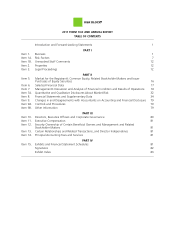HR Block 2011 Annual Report Download - page 21
Download and view the complete annual report
Please find page 21 of the 2011 HR Block annual report below. You can navigate through the pages in the report by either clicking on the pages listed below, or by using the keyword search tool below to find specific information within the annual report.We are subject to operational risk and risks associated with our controls and procedures, which may
result in incurring financial and reputational losses.
There is a risk of loss resulting from inadequate or failed processes or systems, theft or fraud. These can occur in
many forms including, among others, errors, business interruptions arising from natural disasters or other events,
inadequate design and development of products and services, inappropriate behavior of or misconduct by our
employees or those contracted to perform services for us, and vendors that do not perform in accordance with
their contractual agreements. These events could potentially result in financial losses or other damages. We utilize
internally developed processes, internal and external information and technological systems to manage our
operations. We are exposed to risk of loss resulting from breaches in the security or other failures of these
processes and systems. Our ability to recover or replace our major operational systems and processes could have a
significant impact on our core business operations and increase our risk of loss due to disruptions of normal
operating processes and procedures that may occur while re-establishing or implementing information and
transaction systems and processes. As our businesses are seasonal, our systems must be capable of processing
high volumes during peak season. Therefore, service interruptions resulting from system failures could negatively
impact our ability to serve our customers, which in turn could damage our brand and reputation, or adversely
impact our profitability. Additionally, due to the seasonality of our tax business, we employ a substantial amount of
seasonal tax professionals on an annual basis. If we were unable to hire a sufficient amount of seasonal tax
professionals, it could negatively impact our ability to serve customers, which in turn could damage our brand and
reputation, or adversely impact our profitability.
We also face the risk that the design of our controls and procedures may prove to be inadequate or that our
controls and procedures may be circumvented, thereby causing delays in detection of errors or inaccuracies in
data and information. It is possible that any lapses in the effective operations of controls and procedures could
materially affect earnings or harm our reputation. Lapses or deficiencies in internal control over financial
reporting could also be material to us.
Our businesses may be adversely affected by difficult economic conditions, particularly if
unemployment levels do not improve or continue to increase.
The difficult economic conditions we are currently experiencing are frequently characterized by higher
unemployment levels and declining consumer and business spending. Poor economic conditions may
negatively affect demand and pricing for our services. Higher unemployment levels, especially within client
segments we serve, may result in clients no longer being required to file tax returns, electing not to file tax returns,
or clients seeking lower cost preparation and filing alternatives. Continued higher unemployment levels may
negatively impact our ability to increase tax preparation clients.
In addition to mortgage loans, we also extend secured and unsecured credit to other customers, including EAs
to our tax clients. We may incur significant losses on credit we extend, which in turn could reduce our profitability.
Economic conditions that negatively affect housing prices and the job market may result in deterioration
in credit quality of our loan portfolio primarily held by HRB Bank, and such deterioration could have a
negative impact on our business and profitability.
The overall credit quality of mortgage loans held for investment is impacted by the strength of the U.S. economy
and local economic conditions, including residential housing prices. Economic trends that negatively affect
housing prices and the job market could result in deterioration in credit quality of our mortgage loan portfolio and
a decline in the value of associated collateral. Future interest rate resets could also lead to increased delinquencies
in our mortgage loans held for investment. Trends in the residential mortgage loan market continue to reflect high
loan delinquencies and lower collateral values. As a result, we recorded loan loss provisions totaling $35.6 million,
$47.8 million and $63.9 million during fiscal years 2011, 2010 and 2009, respectively.
Our loan portfolio is concentrated in the states of Florida, California, New York and Wisconsin, which
represented 20%, 14%, 17% and 8%, respectively, of our total mortgage loans held for investment at April 30,
2011. No other state held more than 5% of our loan balances. If adverse trends in the residential mortgage loan
market continue, particularly in geographic areas in which we own a greater concentration of mortgage loans, we
could incur additional significant loan loss provisions.
Mortgage loans purchased from SCC represent 62% of total loans held for investment at April 30, 2011. These
loans have experienced higher delinquency rates than other loans in our portfolio, and may expose us to greater
risk of credit loss.
H&R BLOCK 2011 Form 10K 9
























